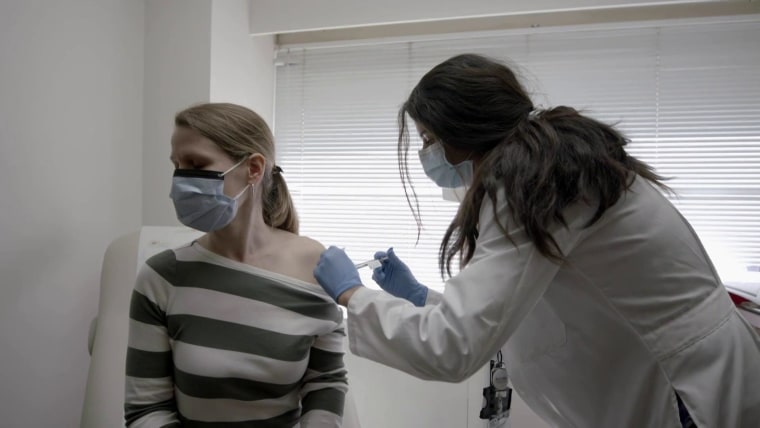Studies of remdesivir — the most promising drug shown to treat COVID-19 so far — will soon enter a new phase of research, even before analysis is completed on the current phase of study.
It's a sign that work to find the right combination of drugs to treat the coronavirus has accelerated as cases are surging in many U.S. states.
Full coverage of the coronavirus outbreak
"It's very intense work, a nonstop process," said Dr. Andre Kalil, the principal investigator for the ongoing remdesivir trial, which is sponsored by the National Institute of Allergy and Infectious Diseases.
In May, his research team published data that showed the drug reduced patients' time in the hospital by about four days, from 15, on average, to 11.
It did not appear to lower deaths from COVID-19, though. It is clear that remdesivir will not be enough on its own — any comprehensive treatment for the coronavirus will require a cocktail of medicines.
This past week, Kalil and his colleagues finished enrolling more than 1,000 patients to test the effect of combining remdesivir, an antiviral, with a pill called baricitinib, an anti-inflammatory, used to treat rheumatoid arthritis.
Preliminary findings from that phase of the study are expected within the month. While researchers work to analyze those results, they will simultaneously move forward with a separate round of studies, testing the impact of remdesivir plus another medication.
Kalil, who is also an infectious disease expert at the University of Nebraska Medical Center in Omaha, declined to disclose the name of the drug before the study launches. However, Gilead Sciences, the maker of remdesivir, previously said it will be tested in combination with another rheumatoid arthritis drug called tocilizumab, sold as Actemra.
Kalil told NBC News that an effective COVID-19 drug combination may eventually include three or four medications, targeting not only the virus itself, but also the immune system's hyperinflammatory response to the infection.
Convalescent plasma
Another key therapeutic is convalescent plasma. Demand for the antibody-rich blood product from COVID-19 patients who have recovered has been high, with an estimated 25,000 patients already transfused in the United States, Gary Disbrow, acting director of the Biomedical Advanced Research and Development Authority (BARDA), told a Senate Appropriations subcommittee during a hearing Thursday.
That included as many as 1,000 COVID-19 patients in a single day this past week, said Dr. Arturo Casadevall, chair of Johns Hopkins' department of molecular microbiology and immunology. He also serves as the lead investigator for two studies on convalescent plasma at Johns Hopkins.
Download the NBC News app for full coverage of the coronavirus outbreak
That research so far, he said, has shown convalescent plasma to be safe. Doctors have reported anecdotal success, but clinical trials to determine whether convalescent plasma is indeed effective are ongoing. Early indicators "are encouraging," Casadevall said.
As part of Operation Warp Speed, the U.S. government is building a cache of the plasma, which can be frozen and stored for up to a year.
"We are investing in a collection of convalescent plasma," Disbrow told the Senate subcommittee. He added there is also investment in neutralizing monoclonal antibodies, which are virus-fighting antibodies produced in a lab, and hyperimmune globulin, which is a concentrated form of antibodies.
"BARDA is involved in discussions with American Red Cross and America's Blood Centers about the possibility of ramping up collection of COVID-19 convalescent plasma," a Department of Health and Human Services spokesperson wrote in an email. "Although there are no set numbers on how much convalescent plasma should or could be collected, BARDA and these blood collection organizations have discussed collecting enough plasma not only to meet the immediate needs of hospitalized patients and collect for the production of hyperimmune globulin products but also potentially to create an inventory or stockpile of frozen convalescent plasma if there is sufficient supply."
"There is a need for plasma in this country. If you have had COVID, please donate."
Monoclonal antibody treatments are unlikely to be available until this fall, according to Casadevall. For now, people who have recovered from COVID-19 are encouraged to donate their plasma to help others.
"There is a need for plasma in this country. If you have had COVID, please donate," he said.
Other potential treatments
Meanwhile, clinical trial results from the University of Oxford in England have suggested a common steroid called dexamethasone can reduce deaths among the sickest patients by a third. The findings from the Recovery trial were published on a preprint server called medRxiv, and have not been peer-reviewed.
Scientists are also working to produce remdesivir in a more user-friendly form. It's currently administered through an IV, but Gilead Sciences has begun studying an inhaled version of the drug.
That "could potentially allow for easier administration outside the hospital, at earlier stages of disease," Gilead CEO Daniel O'Day wrote in a letter on the company's website. "That could have significant implications in helping to stem the tide of the pandemic."
Follow NBC HEALTH on Twitter & Facebook.
"enter" - Google News
July 04, 2020 at 05:02PM
https://ift.tt/2AxMzUq
What is the best way to treat COVID-19? Remdesivir and plasma are promising, but other drugs are needed. - NBC News
"enter" - Google News
https://ift.tt/2TwxTMf
https://ift.tt/3d6LMHD
Bagikan Berita Ini















0 Response to "What is the best way to treat COVID-19? Remdesivir and plasma are promising, but other drugs are needed. - NBC News"
Post a Comment